7.初二牛津英语专题学习加强巩固(寒)-8Bunit1现在进行时-学生.doc
八年级上册英语牛津版笔记

八年级上册英语牛津版笔记以下是八年级上册牛津版英语的学习笔记:Unit 1:现在和过去1. 现在进行时(Present Continuous Tense):表示正在进行的动作或正在发生的情境。
结构为“be动词+动词-ing”。
例如:I am studying English。
2. 现在完成时(Present Perfect Tense):表示已经完成的动作或已经发生的情境。
结构为“have/has+过去分词”。
例如:I have studied English for two years。
3. 一般过去时(Simple Past Tense):表示过去某个时间点的动作或情境。
结构为“动词的过去式”。
例如:I studied English last year。
4. 过去进行时(Past Continuous Tense):表示过去某个时间点正在进行的动作。
结构为“was/were+动词-ing”。
例如:I was studying English at 10 o’clock yesterday。
5. 过去完成时(Past Perfect Tense):表示在过去某个时间点之前已经完成的动作。
结构为“had+过去分词”。
例如:I had studied English before I came to the UK。
Unit 2:频率和频率副词1. 频率副词(Frequency Adverbs):表示动作发生的频率,如always、usually、often、sometimes、never等。
2. 表示频率的句型:“How often do you/does sb. do sth.?”例如:“How often do you go to the cinema?”3. 表示频率的单词和短语:once a week、twice a month、three times a year等。
Unit 3:将来时间1. 一般将来时(Simple Future Tense):表示将来某个时间点将要发生的动作或情境。
英语初中牛津版8bunit1重要知识点归纳

英语初中牛津版8bunit1重要知识点归纳一.【精选词汇】㈠重点短语1.thechangestoSunshineTown阳光镇的变化→thechangesto……的变化(p8) 〈知识链接〉changen.变化,常用复数changes。
e.g.Greatchangeshavetakenplacesince1995.2.inthesouthernpartoftown→inthesouthernpartof…在…的南部→south→southern〈知识链接〉east东部→eastern东部的,west→western,north→northern 3.inthepast在过去→atpresent现在→inthefuture以后;今后,注意这些短语中的介词和冠词。
4.turntheplaceintoapark→turn…into…把…变成…〈知识链接〉①Heatturnswaterintovapor.热使水变成蒸气。
②TurnthissentenceintoEnglish.5.playcardsandChinesechess打牌、下象棋, e.g.It’spleasanttoplaycardsandChinesechess.6.waterpollution水污染→airpollution空气污染,noisepollution噪音污染(p9)〈知识链接〉Waterpollutionwasaproblembefore.edtodumpitswasteintowater→usedtodosth过去常做某事,注意否定式、疑问式的形式〈知识链接〉⑴usedtodosth→否定式usednottodosth或didn’tusetodosth→疑问式Didsbusetodosth?或Usedsbtodosth?⑵Therebe和usedto合用的形式为Thereusedtobe。
依照要求进行句型转换:Sheusedtoteachhistory.①否定式:Sheusedteachhistory.或Shedidn’tteachhistory.②疑问式:sheteachhistory?或Didsheteachhistory?〈用法拓展〉⑴beusedtodosth=beusedfordoingsth被用于做某事,e.g.Stampsareusedtosendletters.=Stampsareusedforsendingletters.⑵be/become/getusedtosth适应于某事,be/become/getusedtodoingsth适应于做某事, e.g.①Mygrandmausedtoliveinthecitybutnowshehasgotusedtothecountrylife.②Tomisusedtogettingupearly.8.insomeways在某种程度上;在某些方面→inthisway以这种方式9.feelabitlonelyfromtimetotime→fromtimetotime=attimes=sometimes有时;不时地〈知识链接〉⑴abit+形容词原级或比较级=alittle+形容词原级或比较级,有点…⑵abitof+不可数名词=alittle+不可数名词 e.g.abitofwater=alittlewater〈用法拓展〉notalittle=very特别,notabit=not…atall一点也不10.throwaway扔掉…→“动词+副词”结构,e.g.throwit/themaway11.haveaninterviewwithsb=interviewsb采访某人;对某人面试;与某人面谈(p12)〈知识链接〉①Myparentshavehadaninterviewwithmyteacher.②Theyinterviewed20peopleforthejob.③Thereareanumberofinterviewswithsomefamousfootballplayers.12.thebestmodelIhaveeverseen我曾见过的最好的模型(p17)〈知识链接〉the+形容词最高级+名词单数+sbhave/haseverdone,某人曾做过的最…的…themostwonderfulfilm(that)hehaseverwatched他看过的最精彩的竞赛〈用法拓展〉⑴ever通常用于疑问句中或否定句中。
牛津英语8BUnit 1 第一课时 八年级英语8B unit 1电子教案[整理1-9课时] 八年级英
![牛津英语8BUnit 1 第一课时 八年级英语8B unit 1电子教案[整理1-9课时] 八年级英](https://img.taocdn.com/s3/m/e40871f9951ea76e58fafab069dc5022aaea46a3.png)
牛津英语8B Unit 1 第一课时教学目标:1.复习以前学过的五种时态2.学习现在完成时重点难点:现在完成时的构成:助动词have/ has +过去分词(p.p.)学情分析:学生开学第一天就学习时态现在完成时可能会比较难接受,所以先要复习以前学过的时态,再慢慢把新时态引出来,要做到由易到难,循序渐进。
教学过程:Step1.review some tenses that students learnt before.Do some exercises.Step 2.Lead in the present perfect tense.T:When did you have breakfast?S:I had breakfast an hour ago.T:He had breakfast an hour ago.He has had breakfast.(Bb)T:Where did you study English last term?S:We studied English in No.2 Middle School.T:Yes.You studied English in No.2 Middle School.You have studied here for about two years.(Bb)→我们用一般过去时谈论过去发生的动作,但当过去发生的动作和现在有联系有影响时,我们用现在完成时态: have/has+V(过去分词)(I/You/We/They have; He/She/It has)Step 3.How we form the past participles of verbs1.Most verbs:eg: visit-visited, move-moved, travel-travelled2.irregular verbs:eg: e-e, see-seen, wrote-written, put-putStep 4.Explain the usage of the present perfect tense.(一)基本用法:到现在为止这段时间已发生的情况.动作从过去延续到现在.eg. She has been ill for three days.We have learned 2,000 English words.2.某个动作虽是过去发生,但其后果和影响及于现在.eg. Thank you.I have had my supper.(现在用不着吃)Tom has seen the film.(对这部电影有所了解)Step 5.Change the above sentence patterns to general questions,negative sentences (hasn’t =has not haven’t =have not)1.She has been ill for three days.Eg: She hasn’t been ill for three days.Has she been ill for three days?Yes, she has./No, she has not (No, she hasn’t)2.We have learned 2,000 English words.3.Tom has seen the film.Step 7. do some exercisesSetp 8 homework教学后记:牛津英语8B Unit 1 第一课时课堂练习一.二.1. Listen! Our English teacher ______ (speak) at the meeting.2. What ______ you _______ (do) last night?3. We’ll go to the park if it _______ (be) fine tomorrow.4. The old man _______ (buy) a colour TV next week, isn’t he?5. Li Ming _______ (be) born in 1985.6. The lady ________ (can run) very fast when she was a girl at school.7. Sorry, we are late. We ______ (not catch) the early bus.8. What _______ the weather ______ (be) like two days away from today?9. There (be) an exhibition of art in the museum tomorrow.10.. Everyone in our class (enjoy) music very much.11.. It’s so cloudy. I think it (rain).12. ______ she ______ (like) to learn how to cook and sew?13. Last term he ______ (spend) a lot of time ______ (practice) his English.14. Look! She ______ (skate) really fast!15. David ______ (break) his arm when he ______ (play) basketball last Sunday.16.I ___ (want) to have a party. But my mother ___ (advise) me not to.17.How soon ___ there ___ (be) a sports meeting?18.I ___ (read) a detective novel at present.三.改写句子1.She has been ill for three days.2.We have learned 2,000 English words.3.Tom has seen the film.4.He has already finished his homework.四.现在完成时专项训练1.I ______ (be) a Party member for a long time.2.Hurry up! Lunch_______ already_______(begin).3.Li Ming _______(hurt) his arm last week.He _______already_______(stay)in bed for five days.4.Have you _______(see)the film “Snow White”?5.I _______just_______(meet) a movie star.。
(精校版)牛津初中英语8Bunit1—unit6知识点归纳

(直打版)牛津初中英语8Bunit1—unit6知识点归纳(word版可编辑修改)编辑整理:尊敬的读者朋友们:这里是精品文档编辑中心,本文档内容是由我和我的同事精心编辑整理后发布的,发布之前我们对文中内容进行仔细校对,但是难免会有疏漏的地方,但是任然希望((直打版)牛津初中英语8Bunit1—unit6知识点归纳(word版可编辑修改))的内容能够给您的工作和学习带来便利。
同时也真诚的希望收到您的建议和反馈,这将是我们进步的源泉,前进的动力。
本文可编辑可修改,如果觉得对您有帮助请收藏以便随时查阅,最后祝您生活愉快业绩进步,以下为(直打版)牛津初中英语8Bunit1—unit6知识点归纳(word版可编辑修改)的全部内容。
牛津初中英语8B unit1—unit6 知识点归纳牛津初中英语8B unit1—unit6 知识点归纳Unit1一.【精选词汇】 ㈠重点短语 1. the changes to Sunshine Town阳光镇的变化→the changes to… …的变化 (p8) <知识链接〉change n.变化,常用复数changes. e.g。
Great changes have taken place since 1995. 2. in the southern part of town →in the southern part of…在…的南部→south→southern <知识链接〉east东部→eastern东部的, west →western,north →northern 3. in the past在过去→at present现在→in the future未来;将来,注意这些短语中的介词和冠词. 4。
turn the place into a park →turn…into…把…变成… 〈知识链接〉①Heat turns water into vapor。
牛津译林八年级下册8BUnit1 知识梳理

牛津译林八年级下册8BUnit1 知识梳理一、重点词汇:1. 时态标志词:一般现在时:from time to time=at times一般过去时:in the past现在进行时:at present现在完成时:in/during/over the past/last XX years / just /since /ever /over the years before (在句末,副词) yet recently重要考点:1) already, yet, just区别already, just只能用于肯定句,yet用于否定句和疑问句just只能放在have和done中间,already可以放在have和done中间或句末,yet只能放在句末。
2) since和for的区别,since的用法since+过去时间点;since+时间段 ago;since+从句(一般过去时) ;since doingIt is 时间段 since+从句for+时间段(注意时态未必是完成时,要看有没有持续到现在)3) just和just now的区别:just是现完标志词,just now是过去时4) ever表示的曾经不同于once,是现完标志词,一般用于疑问句,位置在done前面ever句型:It is the 最高级 sth that I have ever done5) before做副词才是现完标志词,做连词不是。
2. used to用法:(1) 句型:过去常常做used to do 过去有 there used to be 过去是 used to be(2) 同义:used to=once(3) 否定形式:usedn’t to didn’t use to(4) 辨析:be used to doing 习惯于做某事 be used to do 被用来做某事3. northern:在中国北部:in the north of China=in the northern part of China4. married:(1) 注意介词:get married to sb.(2) 持续性动词:be married to(3) 变形:marry vt. marry sb. marriage n. (了解)5. in some ways 在某种程度上way的短语:in this way 用这种方法 on the way to 在去某地的路上 in one’s way 挡了某人的道by the way 顺便说一下6. interview vt. 采访,面试 n. 采访,面试考点:区分动词,名词:have interviewed sb. have interviews with sb.7. return vi. 返回 vt. 归还return to return from 不与back共用return sth. to sb.8. abroad adv. 在国外go abroad 持续性动词be abroad 前面不加介词9. exactly adv. 正是,没错考查变形:exact-exactly考查中文提示:正是如此,确切地考查情景交际。
牛津8B-Unit1知识点归纳、难点解析、语法复习

牛津8B-U n i t1知识点归纳、难点解析、语法复习-CAL-FENGHAI-(2020YEAR-YICAI)_JINGBIAN8B Unit 1 Past and present【短语学习重点】1.an hour ago 一小时前2.not play with you any more 不再和你一起玩3.not…any more = no more = not … any longer = no longer 不再,再也不……4.in the southern part of town 在南部的镇上5.live together till 1965 住在一起直到1965年6.at different times 在不同的时代7.know the city very well 对这所城市非常了解8.(A and B)get married A和B结婚9. A be married to B A和B结婚(延续)10.move to another flat 搬到另外一所公寓11.in the center of town 在镇中心12.change a lot 变化大13.in the past 在过去14.turn/change the place into a park 变成公园15.at weekends 在周末16.play cards and Chinese chess 打牌,下中国象棋17.a shoe factory 一家鞋厂18.water pollution 水污染19.pollute the river 污染河流ed to do sth 过去常常做某事21.dump its waste into the river 把它的废水倒入河里22.the government realized it was a very serious problem政府意识到它是一个非常严重的问题23.take action to reduce the pollution 采取措施来减少污染24.in some ways 在某些方面25.have open space and pretty gardens拥有开放的空间和漂亮的花园26.move out of …搬出……27.feel a bit lonely 感觉有点孤单28.from time to time/at times 不时/有时29.make me very happy 使得我很开心30.move out of the city 搬出这所城市31.because of +名词因为…..32.be lucky enough to see the changes足够幸运地看到变化33.a few times 几次34.miss my friends 想念我的朋友35.see/enjoy the exhibition 看/喜欢展览36.decide to do sth 决定做某事37.since last week 自从上周以来38.for a whole week 整个一星期39.by the way 顺便说40.hear from her 收到她的来信41.travel by plane 乘飞机旅行42.own a boat 拥有一条船43.in fact 事实上44.in the sitting room 在起居室45.a real one 一个真的46.in service 在服务中47.in the past and the present 在过去和现在48.take me to school 带我去学校49.on my own/by myself/alone 独自/单独50.in primary school 在小学ed to be 过去常常是52.a lot more people 更多的人53.change a lot 改变了许多54.why not do sth 为什么不做某事55.since he was born 自从他出生后56.since last Friday 自从上周五57.move into new flats 搬进新公寓58.over the years 在几年间59.have more free time 有更多的空闲时间60.have time to relax more 有时间多放松【句型学习重点】1.Have you seen my food 你见了我的食物了吗2.I’ve known the place for many years. 我了解这个地方已经许多年了。
牛津英语8B Unit 1 第八课时 八年级英语8B unit 1电子教案[整理1-9课时] 八年级
![牛津英语8B Unit 1 第八课时 八年级英语8B unit 1电子教案[整理1-9课时] 八年级](https://img.taocdn.com/s3/m/4b94a73f0812a21614791711cc7931b765ce7ba3.png)
牛津英语8BUnit 1 第八课时Content:Integrated skills B& Study skillsTeaching aims:(1) .To talk about past and present habits(2). To develop dictionary skills and recognize guide words Important point:How to use dictionary easily?Difficult point:How to talk about changes in life?Teaching procedures:Ask two or three students to talk about changes to StarlightTown Step 2 Lead-in1.How do you usually go to school? (on foot/ by bike)2.How did you go to school when you were in primary school?3.What do you often do after class and after school?Step 3 Speak up1. Listen to the tape and answer the questionsa.Who took Millie to school before?b. How did Sandy go to school before?c.Does Millie like chatting with her friends ?d. What does Sandy think of her school life ?2. Read and role-play3.Ask Ss to think about changes in their livesOn foot with parents/On foot on my own/ sb. take me to school by bike/ By bike onmy own/etc.Step 4 Study skills ---using a dictionary1.Teacher presents a passage with some new words and asks students if they want tounderstand the passage how they solve the new words.Guide students to say out ‘We may use a dictionary.’2.Tell students ‘ if we want to use a dictionary effective ly, it is veryimportant to know the sequence of letters in the alphabet.’3. Ask students to call out the letters of alphabet(A-Z) in order.4.Take out a dictionary and ask students to look up the new words in the passage.5.Do P20 Part A and BStep 5Homeworklook up some new words in a dictionary.教学后记:。
牛津英语8B-复习讲义

牛津英语8B Unit 1 复习讲义【小试牛刀】1. He ________________ get up at six in the morning.2. –I’m still not __________ the weather here in Beijing--Yes, the weather can get really cold in Beijing.3. He ______________ go fishing every Saturday. But since he changed his job,he’s barely(几乎不) had a chance. He thinks he’ll never ______________ this busy lifestyle.1. Will you please turn down the radio_____________?2. I’ve got only _______________ money with metoday.I’m afraid I can’t help you.1. He often____________the radio just for fun.2. Look! She_______________her shoes.3. --Have you had your watch__________? --Not yet.二、语法点拨现在完成时(1)1. 根本用法①现在完成时表示在说话之前已经完成或刚完成的动作,强调过去的动作对现在的影响和结果,常与just, already, yet, not…yet, recently等状语连用。
They have already cleaned the classroom. 他们已经把教室清扫干净。
②现在完成时表示动作从过去开始持续到现在,或者还有可能持续下去的动作或状态。
最新牛津8B_Unit1知识点归纳、难点解析、语法复习

8B Unit 1 Past and present【短语学习重点】Comic strip &Welcome to the unit1.an hour ago 一小时前p.6ed to share food with me 过去常常与我分享食物p.63.go to school by bike 骑自行车上学p.74.take a bus to school 乘公共汽车上学p.7 Reading5 . know…very well 非常了解…p.86. since I was born 自我出生以来p.87 . live in the northern part of town住在城镇的北部p.88. get married 结婚p.89. move two blocks away 搬到两个街区以外p.810. since then 从那以后p.811. change a lot 改变许多p.812. over the years 在这些年期间p.813. in the town centre 在镇中心p.814. turn…into…把…变成…p.815. a steel factory 一家钢铁厂p.916. put the waste into the river 把废料扔进河里p.917. take action to improve the situation 采取行动改善情况p.918. much cleaner 干净得多p.919.in some ways 在某种程度上,在某些方面p.920. have a beautiful modern town 拥有一个美丽现代化的城镇p.921. most of my old friends 我的大多数老朋友p.922.move away 搬走p.923. see each other as often as before 和过去一样频繁的见到彼此p.924 play cards and Chinese chess 打牌,下中国象棋p.925. feel a bit lonely from time to time 有时感到有点孤单p.926.the amazing changes 令人惊奇的改变p.927.have an interview with sb. 采访某人p.928. all one’s life 一生p.11 Grammar29.repair over ten bicycles 修十多辆自行车p.1430.the changes in Beijing 北京的变化p.1431.over the past century 上个世纪期间p.1432.learn more about 更多了解关于……p.14 Integrated skills33.clean and fresh air 干净新鲜空气p.1534.living condition 居住环境p.1535.railway station 火车站p.1536.travel to and from the town by bus 乘公交进出城镇p.1637.another big change 另一个大变化p.16ed to live in old houses 过去住在旧房子里p.1639.move into new flats 搬进新的公寓p.1640.return from the USA 从美国回来p.1641.go abroad 出国,去国外p.1642.at primary school 在小学p.1643.keep in touch with each other 互相保持联络p.16municate by email 通过电子邮件交流p.1645.make communication much easier 使沟通更容易p.16Study Skills46.be/get used to (doing) sth 习惯于(干)某事p.1747.on one’s own 独自地,独立地p.17 Task48.narrow and dirty roads 又窄又脏的公路p.1949.wide and clean streets 宽阔而干净的街道p.1950.green trees on birth sides 两边绿树p.1951.open spaces 开阔的空地p.1952.in their free time 在他们的空闲时间p.1953.enjoy a comfortable life 享受舒服的生活p.19【句型学习重点】1.You used to be so kind to me. 你过去对我那么好。
牛津8B Unit1 重点知识梳理
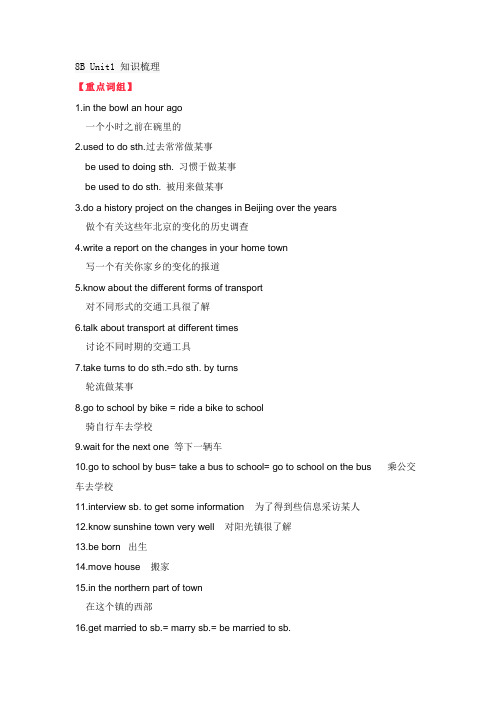
8B Unit1 知识梳理【重点词组】1.in the bowl an hour ago一个小时之前在碗里的ed to do sth.过去常常做某事be used to doing sth. 习惯于做某事be used to do sth. 被用来做某事3.do a history project on the changes in Beijing over the years做个有关这些年北京的变化的历史调查4.write a report on the changes in your home town写一个有关你家乡的变化的报道5.know about the different forms of transport对不同形式的交通工具很了解6.talk about transport at different times讨论不同时期的交通工具7.take turns to do sth.=do sth. by turns轮流做某事8.go to school by bike = ride a bike to school骑自行车去学校9.wait for the next one 等下一辆车10.go to school by bus= take a bus to school= go to school on the bus 乘公交车去学校11.interview sb. to get some information 为了得到些信息采访某人12.know sunshine town very well 对阳光镇很了解13.be born 出生14.move house 搬家15.in the northern part of town在这个镇的西部16.get married to sb.= marry sb.= be married to sb.和某人结婚17.marry sb. to sb. 把某人嫁给某人18.move two blocks away搬到两个街区以外19.live in this area 住在这个地区20.since then 自从那以后since I was born/ since last Saturday/since three days ago 21.over the years 这些年over the past century 在过去的几个世纪22.in the town centre= in the centre of the town 在镇中心23.turn/change/put sth. into 把某物变成某物24.a steel factory 一个钢铁厂25.put the waste into the river 把垃圾倒入河里put down 记下put away 收好put on 穿上put off 推迟、延期26.take action to improve the situation采取行动改善这种情况27.in some ways 在某些方面on the way (to ) 在……的路上by the way 顺便说no way 没门in any way 无论如何28.most of my old friends大部分我的老朋友29.move away 搬走/move to(into) another town30.see each other as often as before像以前一样经常看到对方31.play cards and Chinese chess 打牌和下棋32.feel a bit lonely 感到有点孤单33.from time to time = at times = sometimes 有时34.because of being alone 因为独自一人35.a group of buildings with streets on all sides街道两边全是高楼on both sides/ on each side36.interview sb.= have an interview with sb. 采访某人37.all his life 整个他的一生38.in the past 在过去at present 现在39.make some notes 做些笔记40.waste sth. on sth./ sb.浪费某物在某物/某人上41.repair over ten bicycles= repair more than ten bicycles修理超过10辆自行车42.teach sb. a lot about the history of China教我很多有关中国的历史43.talk about a film about the history of Beijing讨论一个有关北京历史的影片44.learn more about Beijing’s past and present对北京的过去和现在了解更多45.hear about/of 听说hear from sb.= receive/ get one’s letter=receive/get a letter of sb.收到某人来信46.living conditions 居住条件47.return sth. to sb. 把某物归还给某人48.go abroad 去国外at home or abroad 在国内外49.at primary school 在小学50.keep in touch with each other 互相保持联系51.make communication much easier使得联系更容易communicate with sb.和某人保持联系52.take place发生(有目的有计划的)、举行happen发生(偶然发生)53.green hills all around到处都是绿山54.a river runs through the centre of town一条小河穿过镇中心55.get used to the changes of life习惯了生活的变化56.on one’s own = by oneself = alone独自57.throw rubbish 扔垃圾58.in some large open spaces在一些大的开阔的地方59.move into new flats搬到新公寓去60.in their free time在他们业余时间61.travel around the town在镇里转转62.have their own cars= have cars of their own有他们自己的汽车e the new words to talk about my hometown用些新词来讨论我的家乡e facts to support my opinions用事实来支持我的观点【重点句型】1.There were always too many people on the bus, and it took a long time to wait for the next one.公共汽车上总是有太多的人,并且要花费很长时间等待下一趟。
牛津英语8BUnit 1 第二课时 八年级英语8B unit 1电子教案[整理1-9课时] 八年级英
![牛津英语8BUnit 1 第二课时 八年级英语8B unit 1电子教案[整理1-9课时] 八年级英](https://img.taocdn.com/s3/m/e5948dd281eb6294dd88d0d233d4b14e85243ed9.png)
牛津英语8BUnit 1 第二课时Content: ic strip & Wele to the unitTeaching aims:1 To introduce the concept of situations that started in the past and are continuing in the present2 To introduce the grammatical concept of the present perfect tense by focusing on a timeline and ordering information chronologically.Teaching procedures:Step 1:Everyday EnglishStep 2: Review the present perfect tenseTranslate some sentences (oral practice)1.他病了两天了。
2.我入党很长时间了。
3.她刚刚遇到一个朋友。
Step 3: Warm-up activities1) Listen to a short dialogue and think about the following questions:a What was in the bowl an hour ago?(Hobo’s food.)b Why did Eddie eat Hobo’s food?(Because he was hungry.)c Why does Hobo think Eddie has changed?(Because Eddie was kind before.)2) Listen to the dialogue again and try to repeat after the tape3) Read the dialogue together and understand the meaning of the dialogue.4) Read it again and try to recite it and act it out. .Step 4: Wele to the unitA)Review some words about transport(bus, coach, plane, taxi, underground, train)Ask some questions.1) How do you go to school every day?2) How do your parents go to work every day?3)If I want to go to the USA, how can I get there?B)Show some pictures, teach new words (double-decker, light rail)Double-decker: It is a bus with two floors.Light rail: It is a rail transportation system in cities, usually driven by electric power and runs above the ground on tracks.C) Then do P7 Part AMake a dialogue:T: When did people begin to use buses in Beijing?S: People began to use them in 1935.Buses have been in use since 1935.D)Do P7 Part Bplete the timelineMake sentences according to the timetableEg: People in Beijing began to use trains in 1909.Step 5:Homework1.recite some words and phrases2.finish the workbook.3.recite the dialogue of the ic strip教学后记:。
牛津英语8Bunit1unit4知识点整理
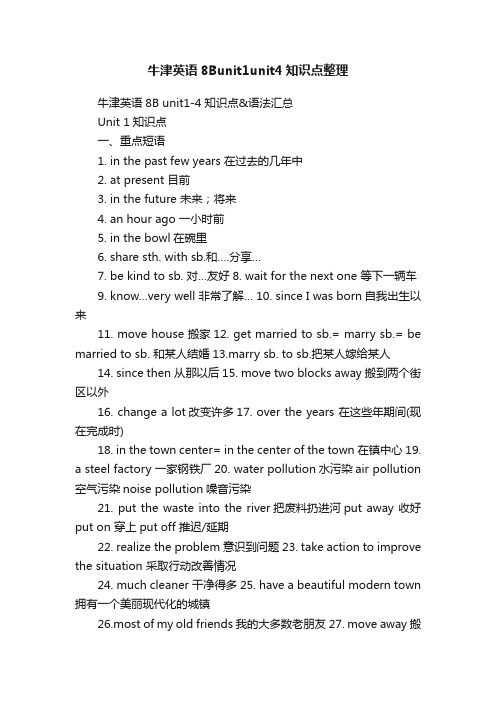
牛津英语8Bunit1unit4知识点整理牛津英语8B unit1-4 知识点&语法汇总Unit 1知识点一、重点短语1. in the past few years 在过去的几年中2. at present 目前3. in the future 未来;将来4. an hour ago 一小时前5. in the bowl在碗里6. share sth. with sb.和….分享…7. be kind to sb. 对…友好8. wait for the next one 等下一辆车9. know…very well 非常了解… 10. since I was born自我出生以来11. move house 搬家12. get married to sb.= marry sb.= be married to sb. 和某人结婚13.marry sb. to sb.把某人嫁给某人14. since then 从那以后15. move two blocks away 搬到两个街区以外16. change a lot改变许多17. over the years 在这些年期间(现在完成时)18. in the town center= in the center of the town在镇中心19.a steel factory 一家钢铁厂20. water pollution水污染air pollution 空气污染noise pollution噪音污染21. put the waste into the river把废料扔进河put away 收好put on 穿上put off 推迟/延期22. realize the problem意识到问题23. take action to improve the situation 采取行动改善情况24. much cleaner 干净得多25. have a beautiful modern town 拥有一个美丽现代化的城镇26.most of my old friends我的大多数老朋友27. move away 搬走28.play cards and Chinese chess 打牌,下中国象棋29. the amazing changes 令人惊奇的改变30.a group of buildings with streets on all sides街道两边全是高楼31..all one’s life 某人的一生32. repair over ten bicycles 修十多辆自行车33.the changes in Beijing北京的变化34. over the past century 上个世纪期间35.learn more about更多了解关于…… 36. pl an to do sth.计划做某事37. hear about/of 听说hear from sb. 收到某人来信38. clean and fresh air干净新鲜空气39.living condition居住环境40. railway station火车站41. travel to and from the town by bus乘公交进出城镇42. another big change 另一个大变化43. move into new flats 搬进新的公寓move out of…搬出…44. return from the USA 从美国回来return sth. to sb. 把某物归还给某人45. go abroad 出国,去国外at home or abroad在国内外46. at primary school 在小学47.keep in touch with each other 互相保持联络municate by email 通过电子邮件交流49.make communication much easier使沟通更容易communicate with sb.和某人保持联系50. be/get used to (doing) sth 习惯于(干)某事get used to the changes of life 习惯了生活的变化51. take place发生(有目的有计划的)、举行happen发生(偶然发生)52. green hills all around 到处都是绿山53. a river runs through the centre of town 一条小河穿过镇中心54. on one’s own = by oneself = alone独自55、throw rubbish扔垃圾56、in some large open spaces 在一些大的开阔的地方57、in their free time 在他们业余时间58、travel around the town在镇里转转59、have their own cars= have cars of their own有他们自己的汽车60.narrow and dirty roads 又窄又脏的公路61.wide and clean streets宽阔而干净的街道62.green trees on both sides两边绿树63.enjoy a comfortable life享受舒服的生活64. from time to time=at times=sometimes有时二、词汇梳理1.I've just eaten it.我刚才把它吃了。
牛津英语八年级下学期期中复习知识点8B-unit1
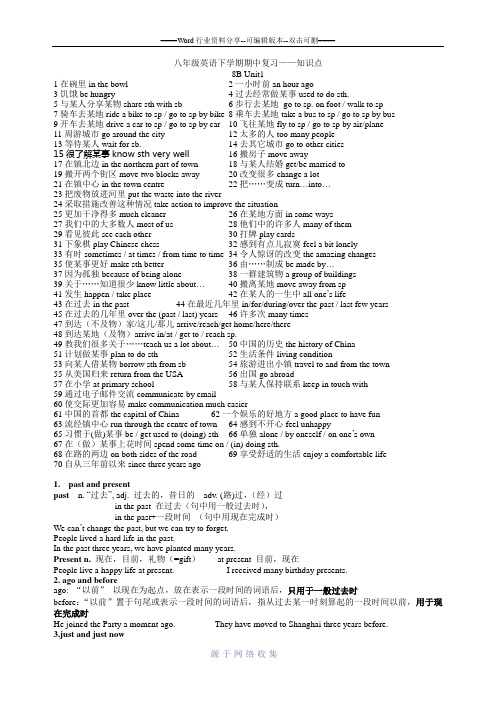
八年级英语下学期期中复习——知识点8B Unit11在碗里in the bowl 2一小时前an hour ago3饥饿be hungry 4过去经常做某事used to do sth.5与某人分享某物share sth with sb 6步行去某地go to sp. on foot / walk to sp7骑车去某地ride a bike to sp / go to sp by bike 8乘车去某地take a bus to sp / go to sp by bus9开车去某地drive a car to sp / go to sp by car 10飞往某地fly to sp / go to sp by air/plane11周游城市go around the city 12太多的人too many people13等待某人wait for sb. 14去其它城市go to other cities15很了解某事know sth very well 16搬房子move away17在镇北边in the northern part of town 18与某人结婚get/be married to19搬开两个街区move two blocks away 20改变很多change a lot21在镇中心in the town centre 22把……变成turn…into…23把废物放进河里put the waste into the river24采取措施改善这种情况take action to improve the situation25更加干净得多much cleaner 26在某地方面in some ways27我们中的大多数人most of us 28他们中的许多人many of them29看见彼此see each other 30打牌play cards31下象棋play Chinese chess 32感到有点儿寂寞feel a bit lonely33有时sometimes / at times / from time to time 34令人惊讶的改变the amazing changes35使某事更好make sth better 36由……制成be made by…37因为孤独because of being alone 38一群建筑物a group of buildings39关于……知道很少know little about…40搬离某地move away from sp41发生happen / take place 42在某人的一生中all one’s life43在过去in the past 44在最近几年里in/for/during/over the past / last few years45在过去的几年里over the (past / last) years 46许多次many times47到达(不及物)家/这儿/那儿arrive/reach/get home/here/there48到达某地(及物)arrive in/at / get to / reach sp.49教我们很多关于……teach us a lot about…50中国的历史the history of China51计划做某事plan to do sth 52生活条件living condition53向某人借某物borrow sth from sb 54旅游进出小镇travel to and from the town55从美国归来return from the USA 56出国go abroad57在小学at primary school 58与某人保持联系keep in touch with59通过电子邮件交流communicate by email60使交际更加容易make communication much easier61中国的首都the capital of China 62一个娱乐的好地方a good place to have fun63流经镇中心run through the centre of town 64感到不开心feel unhappy65习惯于(做)某事be / get used to (doing) sth 66单独alone / by oneself / on one’s own67在(做)某事上花时间spend some time on / (in) doing sth.68在路的两边on both sides of the road 69享受舒适的生活enjoy a comfortable life70自从三年前以来since three years ago1.past and presentpast n. “过去”, adj. 过去的,昔日的adv. (路)过,(经)过in the past 在过去(句中用一般过去时),in the past+一段时间(句中用现在完成时)We can’t change the past, but we can try to forget.People lived a hard life in the past.In the past three years, we have planted many years.Present n. 现在,目前,礼物(=gift)at present 目前,现在People live a happy life at present. I received many birthday presents.2. ago and beforeago: “以前”以现在为起点,放在表示一段时间的词语后,只用于一般过去时before:“以前”置于句尾或表示一段时间的词语后,指从过去某一时刻算起的一段时间以前,用于现在完成时He joined the Party a moment ago. They have moved to Shanghai three years before.3.just and just nowjust:刚刚,刚才,常用于完成时态,放在助动词之后,行为动词之前just now: 刚才,常用于一般过去时,放于句尾’ve changed , Eddie.change. v.改变,变化,交换,替换change….into…..把……变成……change ……for….用……交换……Nothing will change my mind. May I change this pair of shoes for a bigger pair?n. 变化(可数名词,一般用复数),零钱(不可数名词)They are talking about he changes to the big city. Here is your change.5.You used to share food with me.Share sth. With sb. 与某人分享某物used to do sth. “过去常常”(表示过去存在但现在已经不存在的状况或习惯。
牛津英语8BUnit1同步辅导与练习教案
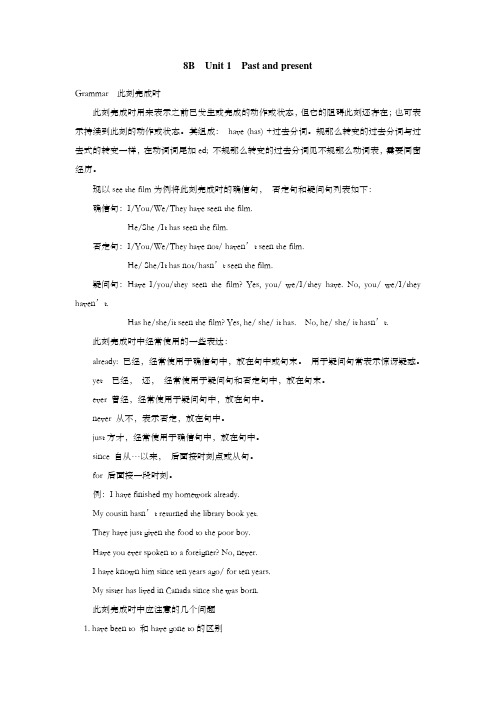
8B Unit 1 Past and presentGrammar 此刻完成时此刻完成时用来表示之前已发生或完成的动作或状态,但它的阻碍此刻还存在;也可表示持续到此刻的动作或状态。
其组成:have (has) +过去分词。
规那么转变的过去分词与过去式的转变一样,在动词词尾加ed; 不规那么转变的过去分词见不规那么动词表,需要同窗经历。
现以see the film为例将此刻完成时的确信句,否定句和疑问句列表如下:确信句:I/You/We/They have seen the film.He/She /It has seen the film.否定句:I/You/We/They have not/ haven’t seen the film.He/ She/It has not/hasn’t seen the film.疑问句:Have I/you/they seen the film? Yes, you/ we/I/they have. No, you/ we/I/they have n’t.Has he/she/it seen the film? Yes, he/ she/ it has. No, he/ she/ it hasn’t.此刻完成时中经常使用的一些表达:already: 已经,经常使用于确信句中,放在句中或句末。
用于疑问句常表示惊讶疑惑。
yet 已经,还,经常使用于疑问句和否定句中,放在句末。
ever 曾经,经常使用于疑问句中,放在句中。
never 从不,表示否定,放在句中。
just方才,经常使用于确信句中,放在句中。
since 自从…以来,后面接时刻点或从句。
for 后面接一段时刻。
例:I have finished my homework already.My cousin hasn’t returned the library book yet.They have just given the food to the poor boy.Have you ever spoken to a foreigner? No, never.I have known him since ten years ago/ for ten years.My sister has lived in Canada since she was born.此刻完成时中应注意的几个问题1. have been to 和have gone to的区别have been to 强调“去过”,现已不在那里,如:He has been to the USA three times.他到美国去过三次。
牛津英语 8B Unit1同步辅导与练习教案
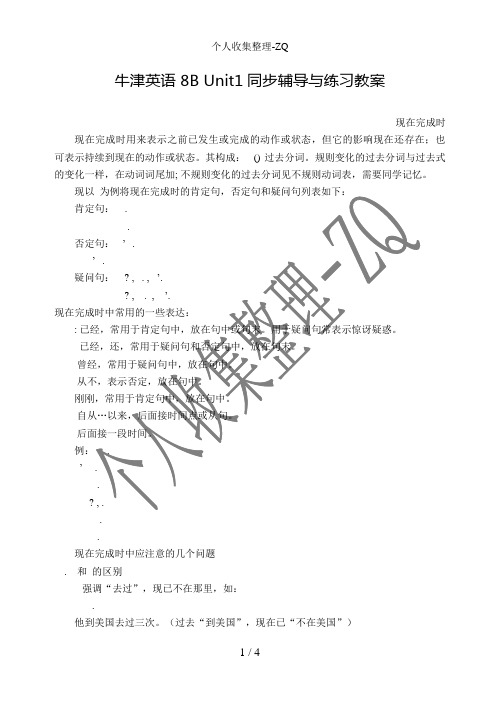
牛津英语 8B Unit1同步辅导与练习教案现在完成时现在完成时用来表示之前已发生或完成的动作或状态,但它的影响现在还存在;也可表示持续到现在的动作或状态。
其构成:() 过去分词。
规则变化的过去分词与过去式的变化一样,在动词词尾加; 不规则变化的过去分词见不规则动词表,需要同学记忆。
:..现在完成时中应注意的几个问题. 和的区别强调“去过”,现已不在那里,如:.他到美国去过三次。
(过去“到美国”,现在已“不在美国”)主要强调的是“去了”,现在人不在说话的现场,如:' ? 你妈妈在哪?. 她去医院了。
. 和的区别强调人“已回到原地”,后面可接表示“次数”的状语。
. ① .② ?' .语。
. ①②③......' .她仍然没收到信。
.上句应改为: .或 .这辆车她买了一年了。
常见的瞬间动词有:, , , , , , , , , , , , , , , , 等。
如果句中有表示一段时间的状语,需将瞬间动词改为延续性动词,现归类如下:: . ... .【典型例题】. — , . , . ?— , .. . . . . .... —.. —.. ’ ... —..【二、用动词的适当形式填空. ( ) .. () ?, () .. () ?, () .() ?( ) .. () ?() .. () () .. () .. () .. — ? — () ......一、二、三. ’ ’ .。
- 1、下载文档前请自行甄别文档内容的完整性,平台不提供额外的编辑、内容补充、找答案等附加服务。
- 2、"仅部分预览"的文档,不可在线预览部分如存在完整性等问题,可反馈申请退款(可完整预览的文档不适用该条件!)。
- 3、如文档侵犯您的权益,请联系客服反馈,我们会尽快为您处理(人工客服工作时间:9:00-18:30)。
Overview教案撰稿人王老师完稿时间2015.1审核人英语备课组审核时间课程进度第7次课课程标题8B Unit 1 现在进行时学生对象:牛津八年级下学期教学目标1) 准确掌握:一般现在时的用法;3)准确掌握:综合练习教学安排一览事项时间1 一般现在时45分钟2 45分钟3 综合练习30分钟45Introduction-words & expressionsPresentationFocused Practice1. 一般现在时&现在进行时的特殊用法1. 一般现在时的特殊用法:表示客观真理、自然现象往往要用一般现在时表示。
如:The moon goes round the earth.月亮绕着地球转。
2. 现在进行时的特殊用法:现在进行时与always 连用时,往往含有赞扬、厌恶、责备等感情色彩。
如:He is always working hard. 他总是非常努力地工作。
(表示赞扬)come, go, begin, start, leave 等动词常用现在进行时表示将要发生的动作。
如:I'm coming. 我就来。
选择填空( ) 1. Father usually ______ his newspaper after dinner.A. readB. readsC. readingD. is reading( ) 2. The Blacks often ______ to the cinema on Saturday evenings.A. goB. goesC. is goingD. are going( ) 4.--- What is Tom doing in the classroom?--- He ______ something on the blackboard.A. drawsB. drawC. is drawingD. are drawing.( ) 5.Old Tom usually ______ up at six and ______ sports in the garden.A. gets, dosB. gets, doesC. get, doesD. gets, do( ) 6. It’s ten o’clock and Jack ______ still(仍然) ______ his homework.A. is, doB. is, doingC. are, doD. are, doing( ) 7. The waiters ______ to work at five every morning.A. startB. startsC. startingD. are starting四、用括号中动词的适当形式填空。
1. Every year my parents _______________ (give) me a present for my birthday.2. Mike, where are you? ___________ you ____________(wait) for me there?3. What __________ you always ____________ (do) on weekends?4. We usually ___________ (have) four classes in the morning. There ________ (be) a break between two classes.5. Look! Something _______________ (lie) there.6. She _______________ (write) a letter now.7. The singer ______________ (sing) two songs on TV once a week.8. Your teacher ______________(look) young though he is sixty years old.9. My aunt ________________ (arrive) here to see me at the beginning of next month.10. Listen! The students ________________ (sing) Take Me to Your Heart.11. I think Tom ________________ (know) the answer. knows12. I ______________ (get) up at six and ________________ (have) my breakfast at about six thirty then I _______________ (go) to school at seven every day.13. Please hold on. He __________________ (come).14. Everyone _______________ (want) a good job.15. The reading room is quiet. Everybody ______________(read) books or magazines.16. We often __________________ (play) games.17. Keep quiet. Father _________________ (sleep) in the next room.18. ——What’s your plan about the vacation?—— We _________________ (go) to the beach. Will you please go with us?19. Jenny _________________ (visit) her grandparents every Saturday.20. —— What __________ Ann ____________ (do)?—— She ________________ (do) her homework.A. Choose the best answer. (根据短文内容,选择最恰当的答案) (12分)①After months of hard work, it's time to have fun during the summer holiday! If you are still planning what you are going to do during the days, why not enjoy a visit to a theme (主题的)park?②Lots of theme parks have roller coasters (过山车). A roller coaster is anything that may appear dangerous while in fact, it's perfectly safe for family fun as long as you are over the height of 48 inches. If you likeheart-stopping thrills, this "scream machine" is your best choice. For example, Kingda Ka is a steel roller coaster located at Six Flags Great Adventure in the United States It is the world's tallest roller coaster, the world's second fastest roller coaster. Riding this roller coaster makes you feel like you are flying. One second you may be looking at the sky and the next you are looking straight down at the ground!③Does this sound scary (惊悚的)to you? If so, we will take you to other theme parks around the world. Ocean Park in Hong Kong is the first stop. You can walk through an underwater tunnel as sharks swim overhead or watch a dolphin swimming show. Besides, cable cars will carry you more than 200 metres to the top of the park.④Europa-Park is another good choice. If you think a few days are not enough to travel through Europe, this theme park in Germany will show you what other European countries arc like. Europa-Park has 12country-themed areas. You can first ride French bobsleds (雪橇), then eat Greek sandwiches and then take a roller coaster based on the Russian space station-all in one day! Besides, Europa-Park is very real. The street lights in the Spanish part are from Spain and the small houses in the Swiss part come from Switzerland.⑤Our last stop is Universal’s Islands in the US, a world-famous dinosaur theme park. If you are a fan of dinosaurs, it is just the place for you. You can have an unforgettable experience and see dinosaurs in their natural homes. But be careful! Escaping from the terrible mouth of a hungry dinosaur is a 26-metre drop into the darkest darkness!69. It's a good choice lo _____ if you like heart-stopping thrills.A) ride a roller coaster B) invent a machine to screamC) look at the sky D) look straight down70. ______will take you to the highest point of Ocean Park?A) An underground B) A cable carC) A tunnel D) A 200-metre rope71. You can enjoy the activities in Europa-Park except ______A) riding French bobsleds B) eating Greek sandwichesC) visiting Russian space station D) watching Spanish street lights72. You have to ______to escape from a hungry dinosaurA) become a crazy fan of dinosaurs. B) see dinosaurs in their natural homes.C) run into the dinosaur's mouth.D) jump from an extremely high place.73. Which of the following is Not True according to the passage?A) Six Flags Great Adventure lies in the USA.B) The Ocean Park is a tourist attraction in Hong Kong.C) The Europa-Park is located in some European countries.D) You may visit Universal’s Islands in America.74. How is the passage organized in structure (结构)?(①=Paragraph (段落) 1, ②= Paragraph 2, ③= Paragraph 3, ...)Homework。
